We’ve all done it. You climb into bed after a long day, thinking you’ll just check your phone for a minute. One scroll turns into five, five turns into fifty, and before you know it—an hour has passed. You’re wide awake, eyes tired, mind spinning. Sound familiar?
1.Around 90% of adults use a digital device within one hour of bedtime
Most people have a little habit they don’t think much about. They reach for their phone, tablet, or laptop before bed. Maybe to check messages, scroll social media, or watch a quick video. It seems harmless. But here’s the problem: almost 9 out of 10 adults are doing this—every single night.
That one hour before sleep is powerful. It’s the time when your brain begins to slow down. Your body starts to cool. Hormones like melatonin rise to prepare you for rest. But when a screen comes into the picture, that natural process hits a wall.
The light from screens tells your brain, “Hey, stay awake!” It tricks the body into thinking it’s still daytime. And if almost everyone is using devices before bed, it means most people are disrupting this critical phase. Not just once. Every night.
For kids, this is even more serious. Their brains are still growing. They need strong sleep routines to build memory, learn new things, and grow emotionally. When devices come in and steal away that transition to sleep, it creates a ripple effect that impacts their entire day tomorrow.
So what can you do?
Start by creating a “no screen zone” at least one hour before bedtime. Make it a family habit, not a punishment. Have fun with it. Switch screens for quiet reading, coloring, puzzles, or soft music. Let bedtime feel like a wind-down, not another moment to be online. You’ll help your child sleep better—and you’ll likely sleep better too.
This simple shift—cutting screens one hour before sleep—can improve focus, calmness, and memory in just a few weeks. The best part? It doesn’t cost anything. Just a little change in routine.
2.Exposure to blue light before bed can suppress melatonin production by up to 50%
Your brain has a natural clock. It uses light and dark to figure out when to sleep and when to wake up. One of the key tools it uses is melatonin. This hormone rises when the sun goes down, telling your body it’s time to rest.
Now imagine cutting that signal in half. That’s exactly what blue light from screens does. If your child is using a phone, tablet, or computer before bed, their body might make 50% less melatonin than it should. That’s like driving at night with half your headlights off.
Melatonin isn’t just for sleep. It also helps regulate mood, behavior, and brain function. A lack of it can leave kids feeling restless at night and groggy in the morning. Over time, this small change adds up. It becomes harder for them to fall asleep. Their sleep is lighter. They wake up more often. And during the day, they might struggle with attention and memory.
This is why blue light is such a big deal. You can’t always see the effect right away—but it’s there, working quietly in the background.
Here’s what you can do.
First, set a firm “screens off” time before bed. One hour is great, but even 30 minutes can help. Next, if screens must be used, use “night mode” or blue light filters. These settings are built into most devices and can reduce the blue light impact.
Lastly, make sleep sacred. Talk about it with your child like it’s a treasure. Protect it. Make a cozy bedtime ritual that doesn’t involve screens. Over time, their sleep will improve—and so will their learning, focus, and mood.
3.Using screens before sleep can delay REM sleep onset by 30–60 minutes
REM sleep is like a workout for the brain. It’s where dreams happen, and where memory gets stored and sorted. It’s also when your brain turns short-term learning into long-term knowledge.
But when screens are used before bed, the brain’s path to REM sleep gets blocked. It’s like a traffic jam in your head. Instead of entering REM sleep within the first 90 minutes, it might take 30 to 60 minutes longer. That means by the time your child finally hits that important stage of sleep, it’s already been cut short.
Why does this matter?
Because kids need more REM sleep than adults. It’s during this time that their brains build strong connections. It’s when they process emotions, sort through the day’s learning, and build memory. When REM is delayed, all of this gets affected.
Imagine your child studying for a math test, then scrolling TikTok in bed. If REM sleep is delayed, that math lesson might never get locked into memory. It just floats away.
So what’s the fix?
Make bedtime predictable. Help your child wind down with calm activities like drawing, soft reading, or a warm bath. Keep their room dimly lit and cool. Avoid heavy snacks or caffeine. But most of all, keep screens out of the bedroom. Make their sleep space a true rest zone—not another place to be online.
REM sleep can’t be replaced with naps or extra sleep on the weekend. It happens in cycles, and when the cycle is delayed, it doesn’t always catch up. The earlier your child hits REM, the more their brain grows and learns.
4.Teenagers who use devices in bed get on average 1.5 hours less sleep per night
Teenagers are known for staying up late. But it’s not just a phase—it’s also biology. Their natural sleep clock shifts during puberty. They start feeling tired later in the evening, even if school still starts early. Now add screens to that mix, and the problem gets worse.
Teens who use phones or devices in bed are losing an average of 1.5 hours of sleep each night. That’s nearly 10 hours every week. Imagine trying to function after missing a whole night of sleep—every single week.
Sleep isn’t just rest. For teens, it’s fuel for growth, focus, learning, and emotional control. Without enough of it, school becomes harder. Memory fades. Mood swings grow. Even decision-making can suffer. It’s not just about being tired. It’s about being unable to thrive.
This is a huge reason why many teens are struggling, even when they’re trying their best. The screen is stealing their sleep.
So what can you do as a parent?
Start by setting a screen curfew. Make it non-negotiable. Help your teen understand it’s not about rules—it’s about results. Sleep is their superpower, and bedtime scrolling takes it away. Remove chargers from the bedroom. Create a family phone station where devices sleep at night. Make the bedroom a “tech-free” zone after a certain hour.
This might be hard at first. Teens love their independence. But when they start sleeping more, they’ll feel better—and they’ll notice. Better mornings. Stronger focus. More energy. That 1.5 hours? It’s the difference between just getting by and really growing.
5: Sleep deprivation reduces memory recall accuracy by up to 40%
When we don’t sleep enough, our brain gets foggy. But it’s not just about feeling tired—it’s about actually forgetting things we’ve learned. Studies show that memory recall can drop by up to 40% when someone is sleep deprived. That’s nearly half of what they were supposed to remember—gone.
Now imagine your child spending hours studying, then staying up late watching videos or scrolling. The next day, they may not remember what they learned at all. Not because they didn’t try. Not because they weren’t smart. But because they didn’t sleep.
Sleep is when the brain organizes everything it picked up during the day. During deep sleep and REM sleep, the brain moves information from short-term memory into long-term storage. If that process is interrupted by lack of sleep or late-night scrolling, memories can slip away like sand through fingers.
This becomes a huge issue for schoolwork. A child who is regularly sleep-deprived might struggle with simple recall, get lower test scores, and feel like they’re not good at learning—even though the real problem is their sleep.
So how do you fix this?
Create a nightly “power-down” routine. It doesn’t have to be perfect, but it should be consistent. Maybe it starts with brushing teeth, then reading a short book, followed by turning off all screens. Build this habit over time, and stick with it even when life gets busy.
Also, help your child understand that their brain needs sleep to remember. They’ll start to feel the difference. Better recall. Sharper thinking. Fewer forgotten assignments. More confidence.
When you protect your child’s sleep, you protect their ability to learn. And that’s something no screen is worth losing.
6: REM sleep accounts for about 20–25% of a healthy night’s sleep
Not all sleep is the same. There are different stages, and each plays a special role in keeping our brains and bodies healthy. One of the most important stages is REM sleep, which usually makes up about 20 to 25% of a full night’s sleep.
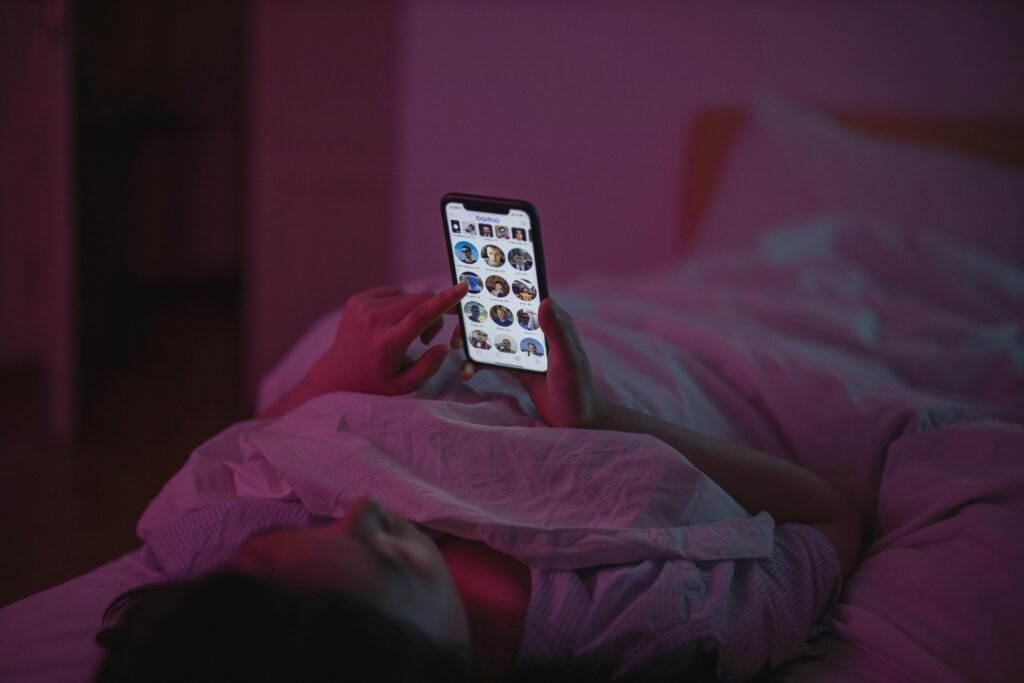
During REM, the brain is super active. This is when dreaming happens. But more importantly, it’s when emotional and procedural memories are formed. Think of it like your brain’s filing system, sorting everything you saw, felt, and learned throughout the day.
For children and teens, this stage is golden. It helps with emotional regulation, learning new skills, remembering facts, and even developing creativity. But when screens delay or reduce sleep, REM gets pushed aside. It often comes later in the sleep cycle, so cutting sleep short means REM gets cut too.
And the problem grows. When kids miss out on REM night after night, they may become more anxious, forgetful, or emotionally reactive. They may have trouble learning new things or remembering old ones. It all links back to this critical part of sleep.
So what can parents do?
Help your child protect their full night’s sleep. Most kids need 9–11 hours a night. That gives their brain enough time to cycle through all the sleep stages, including plenty of REM. Remove anything that cuts sleep short—especially screens.
You can also explain this to your child. Tell them REM is like their brain’s superpower. When they sleep well, they remember more, feel calmer, and think faster. The better the sleep, the stronger the brain.
REM is the secret sauce of learning. And bedtime scrolling takes it away before your child even knows it’s gone.
7: Bedtime scrolling increases the chance of insomnia symptoms by up to 200%
When your child scrolls through a phone or tablet before sleep, it might seem like a way to relax. But the truth is, it’s doing the opposite. Screen time in bed can actually make it twice as likely—or even more—to develop insomnia symptoms.
That means trouble falling asleep. Waking up often. Lying awake in the middle of the night. And waking up feeling unrefreshed. These signs of insomnia are becoming more common in kids and teens, and one major cause is bedtime scrolling.
Here’s why.
The content they’re seeing might be fast-paced, exciting, emotional, or even stressful. Whether it’s a video, game, or chat, it keeps their brain active. This mental stimulation makes it hard to slow down. Add in the blue light, and now their body’s natural sleep signals are confused. It’s like trying to sleep after drinking two cups of coffee.
When this happens often, the body starts to expect this pattern. It becomes harder to fall asleep without screens. That’s how bad habits begin—and how chronic sleep issues start.
But there’s a solution.
Set a clear cutoff time for all screens before bed. Ideally an hour, but even 45 or 30 minutes is a good start. Use that time for relaxing, screen-free activities that help the brain and body calm down. Things like coloring, gentle stretching, or storytelling.
If your child struggles to sleep, look at their evening screen habits. Remove the source of stimulation before bedtime, and you may see a major change within just a few nights. The body wants to sleep. It just needs the chance.
8: Adults who sleep less than 6 hours have a 30% lower ability to recall information learned the previous day
Even adults aren’t safe from the effects of bedtime scrolling. For parents, this is important to know—not just for your kids, but for yourself too. If you sleep less than 6 hours, your brain’s ability to recall information can drop by 30%.
Think about that. You attend a meeting, read an article, or hear something important—then the next day, it’s gone. Not because you didn’t understand it. But because your brain didn’t store it. This is the same thing happening to kids, just on a bigger scale because they’re learning more every day.
When sleep is short, the brain doesn’t have enough time to move new memories into long-term storage. It’s like hitting “save” on a document and pulling the plug before it finishes. The result? Lost work. Lost learning.
Now think about what bedtime scrolling does. It pushes back your sleep. It makes falling asleep harder. It breaks up the deep stages of sleep, especially REM. And that means more memory loss—even when you feel like you “slept enough.”
What can adults and parents do?
Set an example. Keep your own phone out of the bedroom. Charge it outside or in another room. Let your kids see that you take your own sleep seriously. They’ll follow your lead more than your words.
Also, go to bed earlier when you can. Turn off screens at least 30–60 minutes before bed. Read a book. Breathe. Rest. Let your brain reset. Because when you sleep well, you think better, work better—and parent better too.
9: Blue light delays circadian rhythms by an average of 2.3 hours
Your body runs on a natural clock called the circadian rhythm. It tells you when to sleep, wake up, eat, and even when to think clearly. This rhythm is controlled by light—especially sunlight during the day and darkness at night. But there’s a problem: blue light from screens can delay this internal clock by around 2.3 hours.
This means that when your child uses a phone or tablet at bedtime, their brain thinks it’s still daytime. Their body doesn’t start winding down like it should. Instead of feeling sleepy at 9 PM, they might feel wide awake until 11:30 or later. And even if they try to sleep, their body isn’t ready yet.
The longer this pattern continues, the more it shifts their sleep-wake cycle. They begin to fall asleep too late. They wake up feeling groggy. They may feel tired all day and alert again at bedtime. That’s a classic sign of a disrupted circadian rhythm.
When this happens to children and teens, the effects go beyond just feeling tired. Their mood may drop, their ability to focus weakens, and their body doesn’t function at its best. Over time, this shift can even lead to depression, anxiety, and trouble with learning.
The good news? You can help reset your child’s natural sleep clock.
First, reduce screen time at night—especially in the last hour before bed. Keep screens out of the bedroom entirely, if possible. During the day, encourage exposure to sunlight, even for just 15 minutes in the morning. Natural light helps anchor their body clock.
If they must use a device at night (for homework or family calls), use blue light filters or “night shift” mode. These settings reduce the harsh light that tells the brain to stay awake.
Think of your child’s brain as a garden. It needs the right balance of light and dark to grow strong. Protect that rhythm, and their sleep—and mind—will thank you.
10: Scrolling in bed has been linked to a 48% increase in difficulty concentrating the next day
We’ve all had those foggy mornings. You wake up, and your brain just doesn’t want to work. Now imagine feeling that way every day—especially when you’re a child trying to learn at school.
Scrolling in bed before sleep has been linked to a 48% increase in trouble focusing the next day. That’s nearly half of your child’s ability to concentrate, gone overnight. Why? Because sleep is fuel for attention. When that sleep is broken or delayed, the brain doesn’t recharge properly.
Instead of being alert, your child is distracted. Instead of staying focused in class, they drift off or zone out. Teachers may think they’re not trying. Parents might think they’re not interested. But really, they’re just tired—and their brain is struggling to keep up.
This isn’t about bad behavior. It’s about biology.
The brain uses sleep to clear out waste, organize thoughts, and prepare for a new day. If that process is interrupted—say, by bedtime scrolling—it doesn’t finish the job. Your child wakes up with a tired brain that can’t filter out noise or lock onto one task.
So how do you help them focus better?
Protect their sleep. Make bedtime a calm, screen-free zone. Set a firm limit for when phones, tablets, and TVs are turned off—ideally an hour before lights out. Replace screen time with calming activities like soft music, journaling, or just quiet conversation.
Also, talk to your child about how sleep helps them think clearly. Make it something they feel proud of, not something they dread. When they feel the benefits—more focus, better grades, less stress—they’ll start to value good sleep on their own.
Better focus starts the night before. And the fix is often as simple as putting the phone down.
11: Missing just one night of REM sleep can reduce learning efficiency by 20–30%
We often think one bad night of sleep won’t matter. But when it comes to learning, missing just one night of REM sleep can lower your child’s ability to absorb and remember new information by 20 to 30%.
That’s almost a third of their learning—wiped out overnight.
Imagine your child spending time reading, practicing math, or preparing for a test. If they don’t sleep well, especially if REM sleep is cut short, a large part of that effort may be lost. Their brain simply didn’t get the chance to “lock it in.”
REM sleep is where the magic happens. It’s when the brain replays and strengthens new connections. Without it, facts fade. New skills don’t stick. Emotional learning also suffers, meaning kids may feel more frustrated or overwhelmed.
This isn’t just about school. It’s about growth. REM sleep helps children build the mental tools they need for life—patience, reasoning, memory, and emotional control.
So what can you do to protect this precious stage of sleep?
Start by ending all screen use at least an hour before bed. Screens not only delay sleep, but they can cut into the later parts of the night when REM sleep is most active. Help your child get the full 9–11 hours they need, so there’s enough time for all the sleep stages, especially REM.
Create a consistent bedtime and wake-up time—even on weekends. This helps the brain know when to expect sleep, and when to prepare for learning.
Teach your child that their brain is like a sponge. If it doesn’t get rest, it can’t soak up anything new. But with good sleep, their brain grows stronger every night.
12: College students using phones before bed report 60% more memory lapses
It’s not just younger kids who suffer. Older students—especially those in high school or college—are also affected by bedtime scrolling. In fact, college students who use phones before bed report 60% more memory lapses than those who don’t.
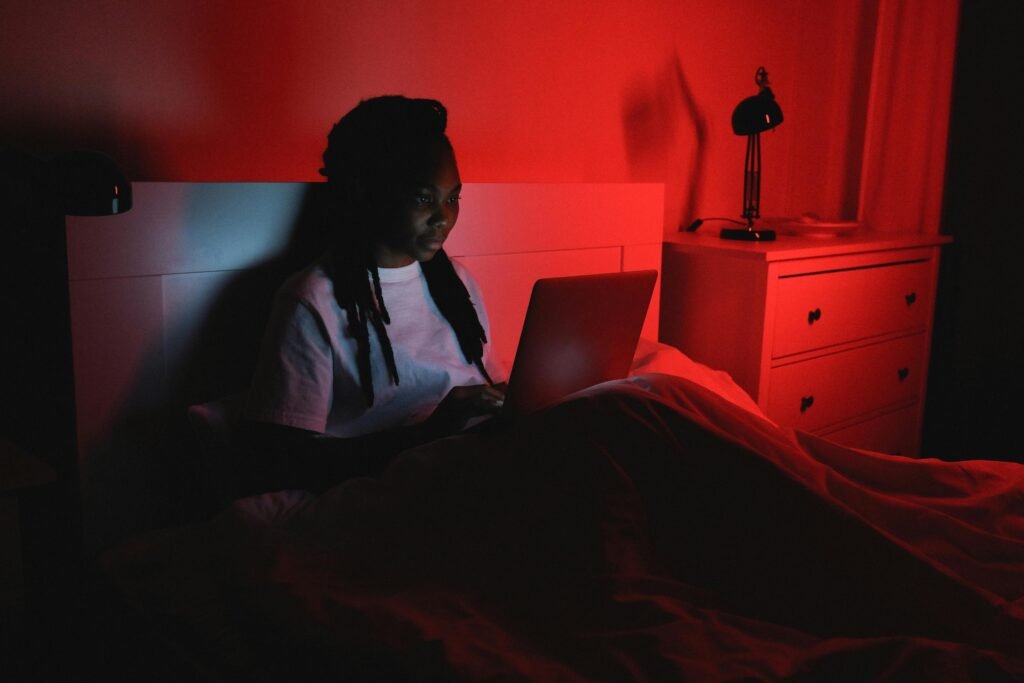
That’s a huge number. And it’s not just about forgetting keys or losing track of time. These students forget lectures, assignments, names, and even basic facts. They’re studying, but the knowledge isn’t sticking.
Why? Because sleep is being disrupted. And without deep, restful sleep—especially REM—new information doesn’t make the leap into long-term memory. It stays in short-term storage for a bit, then fades away.
Late-night phone use is a major cause of this. The light from the screen, the content on the screen, and the mental stimulation all work together to keep the brain alert when it should be shutting down.
As a result, students may feel frustrated. They’re putting in the work, but not seeing the results. It’s not about laziness—it’s about sleep.
So what’s the fix?
Encourage students to power down their phones and computers at least 60 minutes before bed. Use that time for review, journaling, or relaxation. If they must use a device, use blue light filters and keep brightness low. But ideally, nothing stimulating should happen right before sleep.
For parents, talk to your teens and college students about the connection between phone use and memory. Show them the science. Share the stat. Help them see that better sleep means better performance.
Memory doesn’t just happen. It’s built—overnight, during rest. Protect that, and their success will follow.
13: Light from phones/tablets can be as strong as 30–50 lux, enough to signal the brain to stay awake
Let’s talk about light—specifically, the kind that comes from phones, tablets, and computers. You might think it’s just a soft glow. But the truth is, that glow can be 30 to 50 lux in brightness. That’s enough to tell your brain to stay alert instead of winding down for sleep.
Lux is a measure of light intensity. For comparison, a candle gives off about 10 lux. A brightly lit room might go up to 300. But even 30 to 50 lux, especially when it’s shining directly into your child’s eyes, is strong enough to disrupt their natural sleep cues.
Why does this matter? Because our brains are incredibly sensitive to light. When it’s dark, the brain produces melatonin—the hormone that helps us fall asleep. But when light, especially blue light, hits the eyes at night, it blocks melatonin. The brain thinks it’s morning. Sleep gets delayed, and the quality of rest drops.
Children are even more sensitive to this than adults. Their eyes let in more light, and their sleep systems are still developing. So when they lie in bed watching videos or texting under the covers, they’re literally telling their brain, “Stay awake. It’s not bedtime yet.”
This makes falling asleep harder. It pushes back the entire sleep cycle. And even if they do sleep, the quality isn’t the same.
So what can you do?
Start by removing screens from the bedtime environment completely. Don’t just dim them—take them away. Replace them with a gentle bedtime routine that doesn’t involve light directly in the eyes. Reading a paper book under a warm lamp is much better. So is talking quietly, listening to soft music, or just enjoying silence.
You can also install warm-toned light bulbs in your child’s room. These help signal the brain that it’s time to wind down, not wake up.
Think of it this way: your child’s brain is waiting for a cue. Give it the right one—low light, quiet, no screens—and it will reward you with better sleep, better focus, and better moods.
14: Children who use screens before sleep get 23 minutes less REM sleep on average
REM sleep is when the brain gets to work—sorting, storing, and strengthening everything learned during the day. But when children use screens before sleep, studies show they get 23 minutes less REM sleep on average. That might not sound like a lot—but for a growing brain, it’s a huge loss.
Let’s break this down.
REM sleep typically occurs in cycles throughout the night, and each cycle gets longer. The longer your child sleeps, the more REM they get—especially in the early morning hours. But if they fall asleep late because they were using screens, or if their sleep is broken, those REM cycles get cut short.
That 23 minutes of lost REM sleep means fewer dreams, weaker memory consolidation, and less emotional processing. Over time, it adds up. A week of bedtime screen use could mean almost 3 hours less REM sleep—that’s three hours of missed brain development.
This impacts everything. School performance. Mood. Patience. Creativity. Even basic focus.
What’s more, this pattern often goes unnoticed. Parents see their kids going to bed, maybe even sleeping in—but the sleep quality isn’t there. The brain didn’t get what it needed.
So how do we fix it?
The most effective step is to end screen use an hour before bed. Replace screen time with soothing, screen-free activities. A calming bath, reading a bedtime story, or just dimming the lights and talking about the day can work wonders.
Also, move bedtime earlier. The more time your child spends in uninterrupted sleep, the more REM cycles they complete. Protecting that time—especially the early morning hours—means more REM, and a better chance for the brain to grow and heal.
It’s not about forcing sleep. It’s about creating the conditions where REM sleep naturally happens. Take away the late-night screen, and that 23 minutes comes back—and brings memory, peace, and better mornings with it.
15: Chronic REM deprivation has been linked to a 33% higher risk of anxiety disorders
Sleep is not just about rest. It’s the foundation of emotional health. When REM sleep is regularly missed or reduced, children face a 33% higher risk of developing anxiety disorders over time.
This is serious.
REM sleep is when the brain processes emotions. It’s like a reset button for your child’s feelings. It helps them let go of stress, process their day, and feel more balanced in the morning. But when REM is interrupted—say, by bedtime scrolling—this emotional reset doesn’t happen. The brain carries that stress into the next day.
Do this enough times, and small worries can turn into bigger ones. Mood swings become common. Confidence dips. The brain stays in a high-alert state, always on edge. Over time, this can create patterns of chronic worry, restlessness, and even panic.
What’s heartbreaking is that many children can’t explain why they feel anxious. They might not link it to sleep—or lack of it. But the science is clear: a brain without enough REM is a brain under pressure.
As a parent, the best thing you can do is protect your child’s emotional reset.
Create a bedtime environment that’s calm, quiet, and completely screen-free. Be firm about when screens go off, and help your child understand why. You’re not taking something away—you’re giving them peace, rest, and a clear mind.
Also, keep a consistent bedtime and wake-up time, even on weekends. REM cycles depend on rhythm. The more predictable your child’s sleep schedule, the more REM they’ll get.
If your child is already showing signs of anxiety, look at their sleep first. You may find that helping them get more REM sleep is one of the simplest, kindest ways to bring back their smile.
16: Just 90 minutes of lost sleep per night reduces working memory performance by 20%
Working memory is your brain’s whiteboard. It holds information for a short time—like a phone number, a teacher’s instruction, or what you were about to do next. It’s key for learning, problem-solving, and staying organized.
But lose just 90 minutes of sleep in one night, and that working memory drops by 20%.
For a child, this could mean forgetting their homework instructions. Getting stuck in math because they can’t keep all the steps in mind. Losing track during reading. Or walking into a room and forgetting why they’re there. It’s not laziness—it’s a tired brain that just can’t hold on to thoughts.
This is where bedtime scrolling really hurts. When screens delay sleep, even by just an hour and a half, the brain loses that time to recharge. It doesn’t go through all the cycles it needs. The next day, working memory suffers.
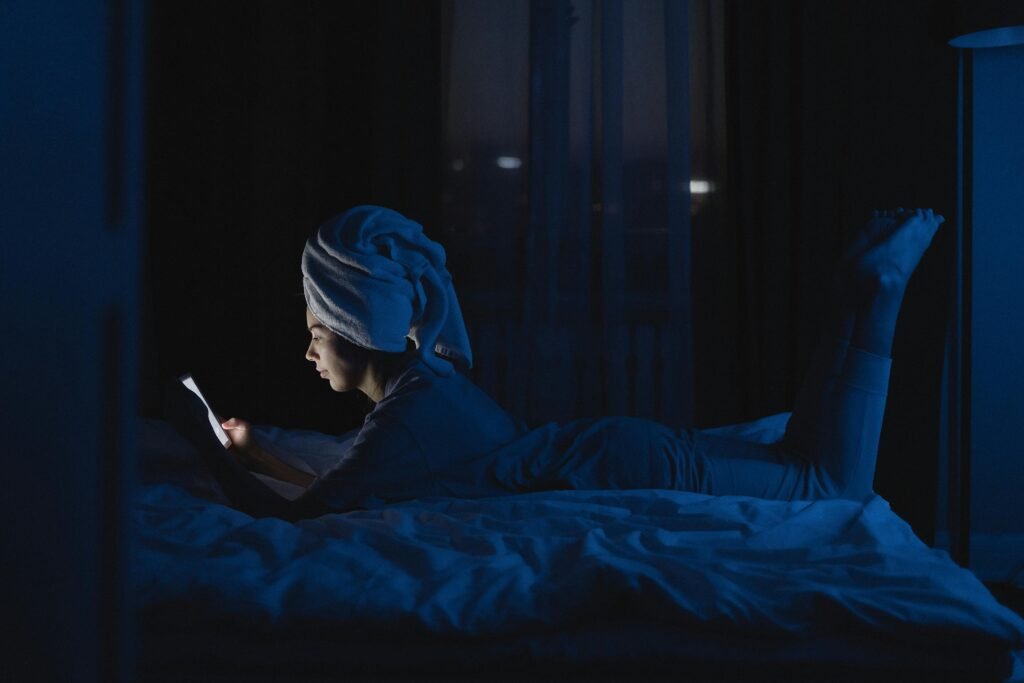
This can create a frustrating cycle. Your child tries harder, gets more tired, then turns to screens to relax—losing more sleep. But there is a way out.
Start with sleep tracking. Count how much sleep your child is actually getting each night. Aim for at least 9 full hours. Then work backward. If wake-up time is 6:30 AM, bedtime should be around 9:00 PM.
Next, protect those hours. No screens after a certain time. No late-night homework marathons. Keep evenings calm, and help your child wind down without overstimulating their brain.
Over time, you’ll notice their memory improves. They’ll hold thoughts longer. Stay on task. Feel more confident. That extra 90 minutes? It could be the difference between frustration and success.
17: Bedtime screen use is associated with a double risk of poor academic performance in teens
Teenagers already have a tough schedule. They wake up early, go through long school days, have after-school activities, and then try to fit in homework. Add bedtime screen use on top of that, and things can start to fall apart. In fact, teens who use screens at bedtime face twice the risk of poor academic performance compared to those who don’t.
That’s double the chance of low grades, missed homework, poor test results, and difficulty staying focused in class. This isn’t just about being tired. It’s about the direct link between screen use, sleep quality, and the brain’s ability to perform.
Here’s what happens: screen time before bed delays sleep. It cuts into REM sleep, weakens memory, and leaves the brain foggy the next morning. Even if a teen is in class and trying hard, their brain may not be fully “awake.” It’s like trying to drive with one foot on the brake.
This problem is worse for teens because their sleep cycle is naturally delayed during puberty. They already feel tired later in the evening. Add a glowing screen to that, and sleep gets pushed back even more. The result? Less sleep, more stress, and a tired brain trying to do a full day’s work.
So what can you do?
First, help your teen understand the why behind better sleep. Show them how sleep helps with grades, memory, and energy. This isn’t about control—it’s about support.
Create a screen-free routine an hour before bed. Set a limit for when devices need to be put away—ideally before 9:30 PM on school nights. Get your teen involved in planning their routine so it feels like a team effort, not a rule.
Encourage them to wind down in ways that prepare their brain for rest. Reading, journaling, stretching, or just having quiet time can all help. When they start sleeping better, they’ll notice the change—and their grades may start to reflect it too.
Remember, academic success doesn’t come from late-night cramming. It comes from a brain that’s rested and ready to learn. Protect that sleep, and you give your teen a real chance to shine.
18: Adults using phones in bed are 2.5 times more likely to wake up during the night
You might think bedtime scrolling only affects how long it takes to fall asleep. But it goes deeper than that. Studies show that adults who use phones in bed are 2.5 times more likely to wake up during the night. And every time you wake up, your sleep quality drops—even if you fall back asleep quickly.
This is important not just for you, but for your kids too. Children watch what their parents do. If they see you scrolling at night, they’re more likely to copy that behavior, even if you tell them not to.
The light from your phone, the movement on the screen, and the mental stimulation from reading or watching content all keep your brain in an alert state. So even after you fall asleep, your brain doesn’t go into deep rest. You’re more likely to wake up during REM sleep or between sleep cycles, which makes your rest feel broken.
And when sleep is broken, the benefits of each stage—REM, deep sleep, light sleep—are interrupted. You don’t get full recovery. Your mind stays tired. Your body feels worn out. And that tiredness builds up over time.
This also affects how you parent. When you’re tired, you may feel more impatient, more stressed, or less focused. That’s why protecting your own sleep is just as important as protecting your child’s.
So what’s the fix?
Start by changing your own bedtime habits. Put your phone down at least 30 to 60 minutes before sleep. Keep it out of the bedroom, or at the very least, off the bed. Use an alarm clock instead of your phone. Read a real book or just relax in silence.
By giving yourself real rest, you become a better role model. Your sleep improves. Your mood gets lighter. And your ability to support your child—through homework, behavior, or emotions—gets stronger.
Sleep isn’t a luxury. It’s a foundation. And it starts with what you do in the last hour of your day.
19: REM sleep is critical for emotional memory consolidation, with 70% of emotional memories processed during REM
REM sleep isn’t just about remembering math facts or vocabulary words. It’s also where the brain processes emotional experiences. In fact, about 70% of emotional memories are handled during REM sleep. That’s huge.
This is the part of sleep where your child’s brain says, “What did I feel today? What made me happy? What scared me? What do I need to understand better?” It takes all those feelings, sorts them out, and puts them in the right place. That’s how your child learns to cope, grow, and feel secure.
But here’s the problem: if REM sleep is shortened—because of screens, stress, or late bedtimes—those emotional memories don’t get processed properly. They stay tangled. Your child may wake up feeling cranky, sad, or anxious—and not know why.
Over time, this leads to emotional overload. Little things start to feel like big problems. Meltdowns become more common. The brain isn’t getting the emotional “clean-up” it needs.
So what can you do?
Protect REM sleep. That means early bedtimes, a calm bedtime routine, and absolutely no screens late at night. Create a home environment where feelings are talked about, but also where rest is valued.
You can even talk to your child about this process. Tell them, “Your brain is like a library. Every night, it files away your thoughts and feelings so you can feel better in the morning. But if you don’t sleep enough, those feelings stay messy.”
Help them take ownership of their sleep. When they get more REM, you may notice they handle stress better. Their mood steadies. They feel stronger, calmer, and more in control.
REM sleep is emotional healing. Without it, the day’s feelings don’t get sorted. With it, your child can face tomorrow with a clear heart and mind.
20: Scrolling for more than 30 minutes before bed can shorten total sleep time by up to 2 hours
It might seem harmless—just 30 minutes of scrolling before bed. But research shows that when kids (and adults) spend more than 30 minutes on their phones or tablets before sleep, their total sleep time can be reduced by up to 2 full hours.
Two hours lost every night adds up fast. That’s 14 hours of missed sleep each week, or almost an entire night’s rest—gone. The worst part? Most people don’t even realize it. They go to bed later, sleep in shorter chunks, or wake up multiple times during the night—and think it’s normal.
This is especially dangerous for children and teens who need at least 9 hours of sleep per night to grow, focus, and stay healthy. If screen time cuts their sleep to just 7 hours, they may feel tired, moody, and unmotivated the next day. And over time, these effects become harder to reverse.
But why does just 30 minutes of scrolling lead to such a big loss?
It’s because screens don’t just delay bedtime—they also make it harder to fall into deep sleep. The brain stays alert longer, and the natural sleep cycles become weaker. Even after the screen turns off, the effects linger for hours. It’s like drinking soda before bed—it gives a burst of energy right when the body should be slowing down.
So what’s the fix?
Keep a close eye on how long your child spends on screens before bed. Even “just 10 more minutes” can lead to a bigger delay than you think. Set a firm cutoff time—ideally 60 minutes before lights out—and stick to it.
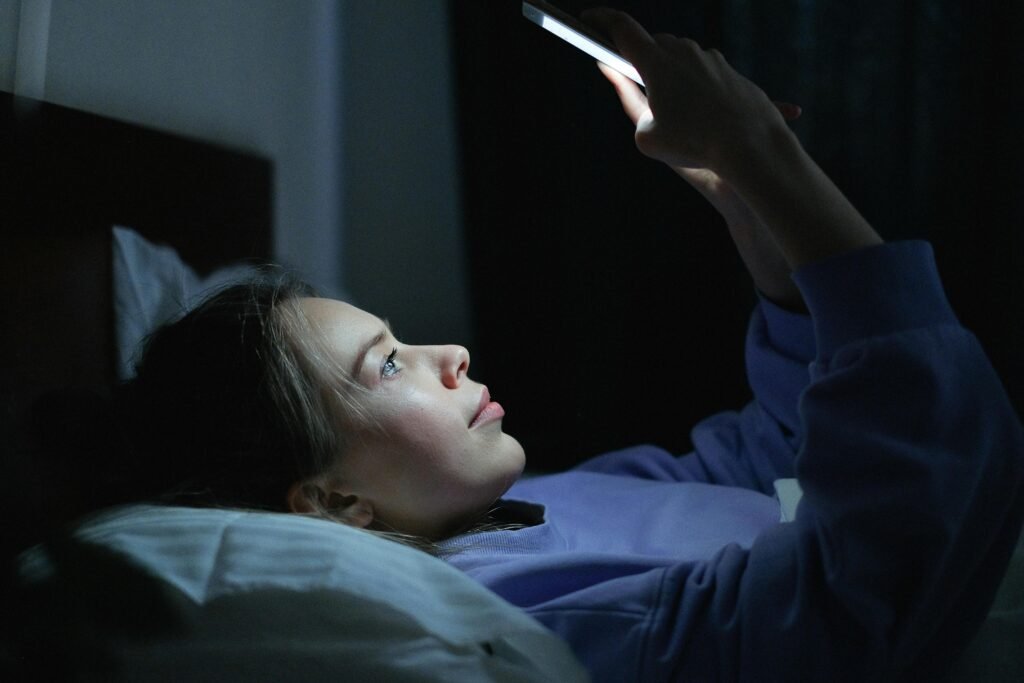
Make the evening feel like a gentle slowdown, not another extension of screen time. Create a “digital sunset” where devices go away and calming activities begin. Help your child wind down with simple things: coloring, music, warm showers, or talking about their day.
You don’t need a perfect routine. Just a consistent one. If you stop the scroll, you give your child back two hours of rest—and a better day ahead.
21: Sleep loss reduces hippocampal activity (memory center) by up to 40%
Deep inside the brain is a part called the hippocampus. It’s like a memory machine. Everything your child sees, hears, or learns during the day passes through this area on its way to becoming long-term memory. But when sleep is lost—especially from late-night screen time—hippocampal activity can drop by up to 40%.
That means the brain struggles to store new information. Lessons get blurred. Stories get jumbled. Homework and facts feel harder to remember. Even simple instructions, like “put your shoes away” or “grab your backpack,” might slip through the cracks.
This isn’t about a child being forgetful on purpose. Their brain is tired. It didn’t have time to strengthen the memory pathways needed to hold on to what they learned.
The hippocampus relies on good sleep—especially REM and deep sleep—to do its job. If that sleep is broken, shortened, or delayed by scrolling in bed, memory suffers.
This shows up in schoolwork, yes—but also in emotional memory. A child might forget praise but remember criticism. Or they may feel like they’re always behind, even when they’re trying hard. That’s not a lack of effort—it’s a lack of sleep.
Here’s how to help.
Keep a consistent bedtime that gives your child at least 9 hours of uninterrupted sleep. Make that time sacred. No screens, no exceptions. If they’re old enough, explain how their brain builds memory at night—like a construction crew that only works while they sleep.
Help them prepare for sleep with low-energy activities that relax the body and clear the mind. Breathing exercises, drawing, gentle yoga, or reading can all help.
When the hippocampus is rested, it works better. Memory gets sharper. Learning feels easier. Your child feels more confident—and that’s the goal.
22: A single hour of screen time at night can lower next-day alertness by 14%
Think one hour of screen time before bed won’t hurt? Think again. Just one hour at night can make your child 14% less alert the next day.
That means slower thinking, weaker focus, and more mistakes in schoolwork. It also means more yawning, less energy, and trouble paying attention. All from just one hour of scrolling, gaming, or watching a show.
Here’s the science behind it. Screens stimulate the brain, especially when they’re bright, fast-moving, or emotional. Even when the content seems calming, like a slow video or a quiet game, the brain is still active. The lights, colors, and movement keep the mind “on.”
So even if your child falls asleep quickly after using a screen, their brain is still recovering from that burst of activity. The next morning, they wake up a little slower, a little foggier. That 14% loss of alertness might not sound like much—but in a classroom, it can be the difference between understanding a lesson and missing it entirely.
And here’s the problem—it’s not just one day. If this habit continues, the alertness drop adds up. Your child may start to feel like school is harder than it is. They may lose motivation, even though the real issue is sleep.
So what’s the solution?
Keep evenings screen-free. If an hour of screen time causes this much trouble, it’s not worth it. Replace that hour with quiet activities that don’t overstimulate the brain. Think: puzzles, light reading, playing with pets, or just relaxing in bed.
You’ll start to see a difference quickly. Mornings become smoother. Getting ready becomes easier. And most importantly, your child feels more awake and ready to learn.
Give their brain the chance to rest—and the next day will thank you for it.
23: REM-deprived individuals perform 50% worse on creative problem-solving tasks
Creativity isn’t just about drawing or painting. It’s also about thinking differently. Solving problems. Coming up with new ideas. And REM sleep plays a major role in this. When someone doesn’t get enough REM, their ability to solve creative problems drops by 50%.
That’s a massive drop. Imagine your child facing a math challenge, a science project, or even a tricky social situation. Without enough REM sleep, their brain struggles to connect ideas or see new solutions. They may get stuck, feel frustrated, or give up quickly.
Creativity isn’t a gift—it’s a skill that grows with sleep. During REM, the brain combines memories, ideas, and emotions. It forms new links between things that seemed unrelated. That’s why many people wake up with fresh ideas or solutions. Their brain was working all night—if they got the right kind of sleep.
But if bedtime is spent on screens, REM gets cut short. The brain doesn’t enter the deeper stages of rest where creative problem-solving skills are strengthened. Over time, this makes your child feel less capable—even though the potential is there.
So what can you do?
Nurture their creativity by protecting their REM sleep. Stick to consistent sleep times. Eliminate screens at night. Create a bedtime that allows for at least 9 hours of sleep so there’s time for multiple REM cycles.
Encourage activities that spark creativity during the day—like storytelling, building, exploring. Then give the brain time to reflect and grow at night.
Your child has incredible ideas inside them. Sleep helps bring those ideas out.
24: Teenagers who use devices after lights out are 3 times more likely to report daytime sleepiness
Teenagers crave independence. They stay up late, chat with friends, and often want that last scroll before bed. But when devices stay on after the lights are out, it doesn’t just steal sleep—it creates real, visible damage. In fact, teens who use their phones or tablets after bedtime are three times more likely to feel sleepy during the day.
That kind of sleepiness isn’t just about yawning in class. It’s the kind that drags through the whole day. Teens might struggle to get out of bed, feel moody in the morning, and have zero focus in school. They may even rely on sugary snacks or caffeine just to get by.
Here’s why.
The time after lights out is critical. That’s when the body is ready to sleep—melatonin is flowing, the mind is slowing, and the muscles are relaxed. But if a screen lights up, the entire system gets thrown off. The brain gets a message: “Stay alert. Keep going.” So instead of falling asleep, the brain shifts back into wake mode. And when sleep finally does come, it’s shallow and short.
The next day, the teen feels it. Their sleep wasn’t restful, and their brain knows it.
What can parents do?
First, set boundaries together. Talk with your teen about how screens affect their brain. Not as a lecture, but as a real conversation. Teens are smart—they’ll understand when you explain it clearly.
Create a phone “curfew.” Agree on a time, like 9:30 or 10:00 PM, when all devices are put away—not just off, but out of the bedroom. Use a family charging station in another room. If needed, use screen time settings to limit late-night access.
Then, help replace that screen time with something soothing. Music. Journaling. Planning tomorrow. Just resting in the dark. These small moments help the brain wind down naturally.
Daytime sleepiness isn’t something teens should accept as normal. With the right changes, they can wake up feeling rested—and show up fully for life.
25: REM sleep loss increases cortisol (stress hormone) by up to 37%
Cortisol is the stress hormone. We all have it, and in healthy doses, it helps us wake up, stay alert, and deal with challenges. But when REM sleep is cut short—especially by bedtime screen use—cortisol levels can spike by up to 37%. That’s like starting your day already in “fight or flight” mode.
For children and teens, this means more anxiety, more emotional outbursts, and less ability to think clearly. Their brains feel overwhelmed. Small problems can feel huge. School feels harder. Friendships feel more stressful. And it all begins with how they slept the night before.
When cortisol stays high, it doesn’t just affect mood. It also weakens memory, blocks creativity, and slows reaction time. This makes everyday life feel tougher, even for the most capable kids.
The root cause? Disrupted REM sleep—often from using screens at night.
To lower cortisol and boost calm, the best first step is to protect sleep. Start with an early, relaxing evening routine. No screens. No rush. Just time to wind down slowly. Give your child enough time to move through all the stages of sleep, especially REM.
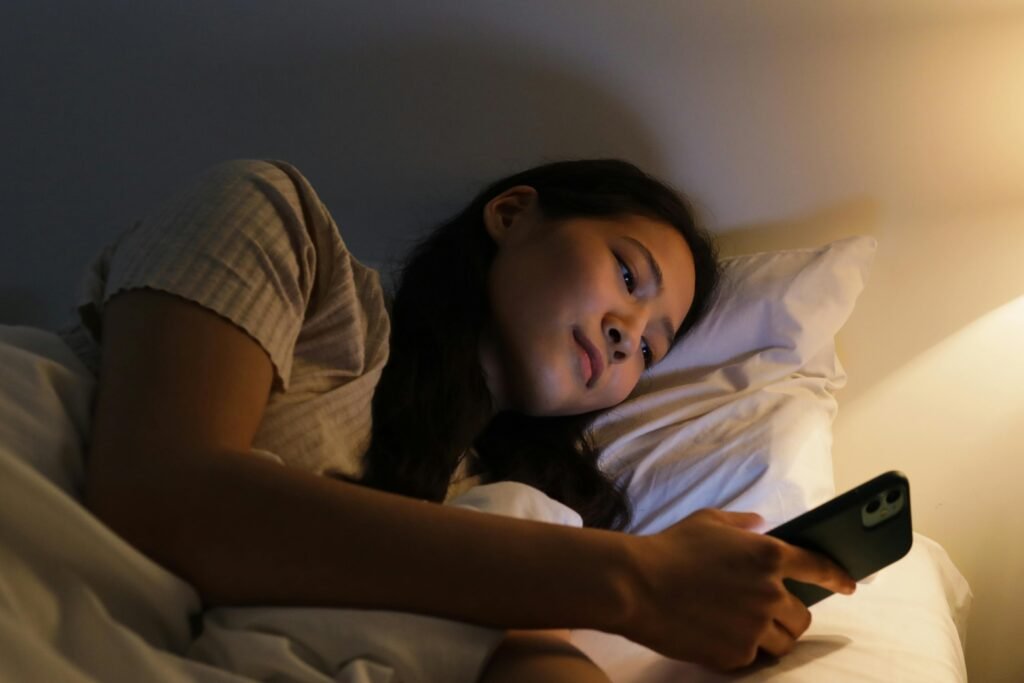
Also, introduce calming habits throughout the day—like fresh air, light exercise, and good hydration. These keep cortisol in check naturally. But sleep is the key. When REM is restored, cortisol falls. Calm returns.
Parents, this is one of the most powerful ways you can protect your child’s emotional health. You don’t need fancy tools or programs—just a screen-free bedtime, a peaceful routine, and enough hours of sleep to reset the brain and body.
Stress is real, but so is recovery. And it starts each night.
26: Adults scrolling in bed take 10–15 minutes longer to fall asleep compared to non-users
Ten to fifteen minutes may not seem like much. But when it comes to sleep, it’s huge. Adults who use their phones in bed take 10 to 15 minutes longer to fall asleep than those who don’t. That delay can push back the entire sleep cycle—and reduce both sleep quality and sleep duration.
Now, imagine losing 15 minutes every night. That’s almost 2 hours of sleep lost every week, just from staying awake longer after using a screen.
Here’s the thing: bedtime is when your body is supposed to shift into rest mode. Your heart rate slows, your mind softens, and your breathing deepens. But when you scroll, especially through social media, news, or games, your brain stays active. It starts thinking, comparing, reacting. It becomes alert—just when it should be shutting down.
This delay means you lose part of your first sleep cycle, which is often the deepest. That’s when the brain and body do their biggest healing. It’s like showing up late to the start of a race—you miss a critical part.
If you’re a parent, this affects you directly. Tired parents have less energy, less patience, and more stress. And your sleep habits shape your child’s too.
So what’s the fix?
Start a no-scroll policy for yourself 30 to 60 minutes before bed. Put your phone away, or charge it in another room. Set an example your kids can follow.
Use this time for things that calm your mind instead. A hot shower. Writing in a journal. Talking with your partner. Stretching. Or simply sitting in silence.
Falling asleep faster isn’t about forcing it—it’s about removing what gets in the way. Skip the scroll, and give your body a head start.
27: People sleeping less than 7 hours per night have a 3x greater risk of developing memory-related illnesses
Sleep isn’t just about resting. It’s about protecting the brain. Studies show that people who get less than 7 hours of sleep a night have three times the risk of developing memory-related illnesses like Alzheimer’s and dementia.
That’s a huge warning sign—not just for adults, but for growing kids too.
When we sleep, especially during REM and deep sleep, the brain cleans itself. It washes out waste, repairs cells, and strengthens memory. Without enough sleep, harmful proteins can build up over time. These proteins are strongly linked to long-term brain issues.
This may sound like something far off, but it starts early. Poor sleep habits in childhood can create a lifetime pattern. If a child regularly scrolls before bed and loses sleep night after night, their brain never fully recovers. Memory suffers now—and the risk of brain diseases goes up later.
But there’s good news: it’s never too late to start protecting memory with better sleep.
Start by tracking sleep in your home. Make sure everyone—kids, teens, and adults—gets at least 7 to 9 hours every night. Set screen cut-off times, ideally an hour before bed. Remove screens from bedrooms entirely, if possible.
Build bedtime routines that support brain health: dim the lights, speak softly, and do calming things. Even just reading a book together can create peace and strengthen connection.
Also, talk about memory. Help your child understand that sleep is like charging their brain. The better they sleep, the more clearly they’ll think. And the longer their brain will stay strong, now and into the future.
Good memory is not just about study habits. It’s about sleep. Protect it—and you protect your child’s future.
28: Memory retention after studying drops by 30–40% if followed by screen use instead of sleep
Picture this: your child finishes studying, then picks up their phone to relax. They scroll, play, or watch a few videos before bed. But here’s the problem—memory retention can drop by 30 to 40% when study is followed by screen time instead of sleep.
That’s nearly half of what they just learned—lost.
Why? Because sleep is when the brain stores information. Right after learning something new, the brain starts a process of “saving” that knowledge. But if screen time comes next, the brain gets distracted. It starts processing what it sees on the screen instead. The study info gets pushed aside and often forgotten.
This is especially true with visual content like games, social media, and videos. The brain shifts focus quickly. So even if your child studied hard, a late-night scroll could wipe out much of that effort.
How can you prevent this?
Make a simple rule: study, then sleep. Not screen.
Encourage your child to finish their homework, then go straight into a calming bedtime routine. Even a few minutes of breathing, light stretching, or reading a printed book can help lock in what they just learned.
Let them know that screens can come after rest—never before. When they sleep right after studying, their brain gets the full chance to store and organize that new information. That’s how learning sticks.
Also, if they need downtime after studying, offer non-digital options. A quick walk, drawing, or a board game can relax them without interfering with memory.
Help your child connect the dots: less screen, better memory. The difference will show up in their grades, their confidence, and how clearly they can think.
29: Bedtime scrolling increases next-day forgetfulness complaints by 60%
Have you ever heard your child say, “I forgot!” multiple times in one day? It’s not just a lazy excuse. Kids who scroll in bed are 60% more likely to say they forgot things the next day.
This includes forgetting to pack their school bag, missing homework, not remembering what they learned, or simply zoning out when asked a question. Forgetfulness becomes a daily struggle—and a source of stress.
Why does this happen?
Because bedtime scrolling interrupts the brain’s ability to file away the day’s experiences. Normally, during sleep—especially REM—the brain organizes memories, emotions, and thoughts. But screen use disrupts this. Instead of storing memories, the brain gets flooded with digital noise. That noise pushes the real stuff out.
So the next morning, your child’s mind feels cluttered. They’re more likely to lose focus, get frustrated, or feel like they’re not “good at remembering”—when in reality, they’re just not sleeping well.
Here’s how to break the cycle.
First, recognize the pattern. If your child complains about forgetfulness, take a look at their nighttime habits. Are they scrolling in bed? Do they have a phone or tablet nearby?
Set a bedtime “tech curfew” where devices are put away at least an hour before sleep. Then help your child transition into rest with something calming. Review the day together. Talk about what they learned or enjoyed. This helps the brain start the storing process before sleep even begins.
Over time, you’ll notice fewer “I forgot!” moments. Your child will feel more confident. And you’ll know their brain is finally getting the space it needs to hold on to what matters.
Forgetfulness isn’t a character flaw—it’s a sign of a tired, distracted brain. With better sleep, that sharpness comes back.
30: Chronic bedtime screen use can lower long-term memory recall by up to 25%
This last stat is a big one. Kids who regularly use screens at bedtime can suffer up to a 25% drop in long-term memory recall. That means one out of every four things they learn might never get stored properly.
This isn’t about occasional use. It’s about a nightly habit—phones under pillows, tablets glowing in the dark, video games that go on and on. Every night this happens, the brain loses valuable time in REM and deep sleep. Over weeks, months, or even years, that lost sleep adds up—and memory suffers.
Long-term memory isn’t just about school. It affects everything. How your child remembers people, places, stories, instructions, and life events. If those memories don’t stick, your child may feel disconnected, behind, or like they’re constantly catching up.
So what do you do?
End the habit—completely.
No more screens in bed. None. Make that the new rule, and be consistent. Remove temptation by charging devices in another room. Use alarms on a physical clock. Make the bedroom a true sleep sanctuary.
Build a new routine around rest. Light music, soft lighting, simple conversations. Keep the pace slow. Let the brain understand: this is the time to wind down, not speed up.
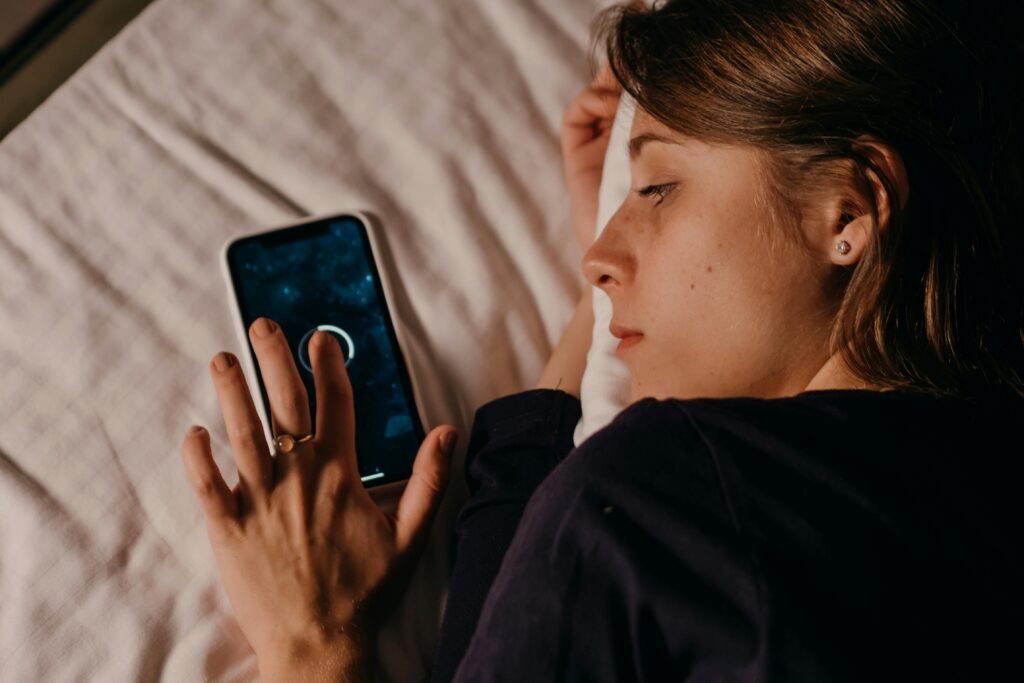
Screen habits can be changed. And the results can be life-changing.
Conclusion:
We live in a world where screens are everywhere. They help us learn, connect, and play. But at bedtime, those same screens quietly steal something precious—our sleep. And not just any sleep, but the kind that helps children grow smarter, calmer, and more confident: REM sleep.
You’ve now seen the truth behind the stats. A single hour of scrolling can delay sleep, weaken memory, and raise stress levels. Regular bedtime screen use doesn’t just lead to tired mornings—it creates real problems with focus, learning, emotional health, and long-term brain development.



